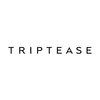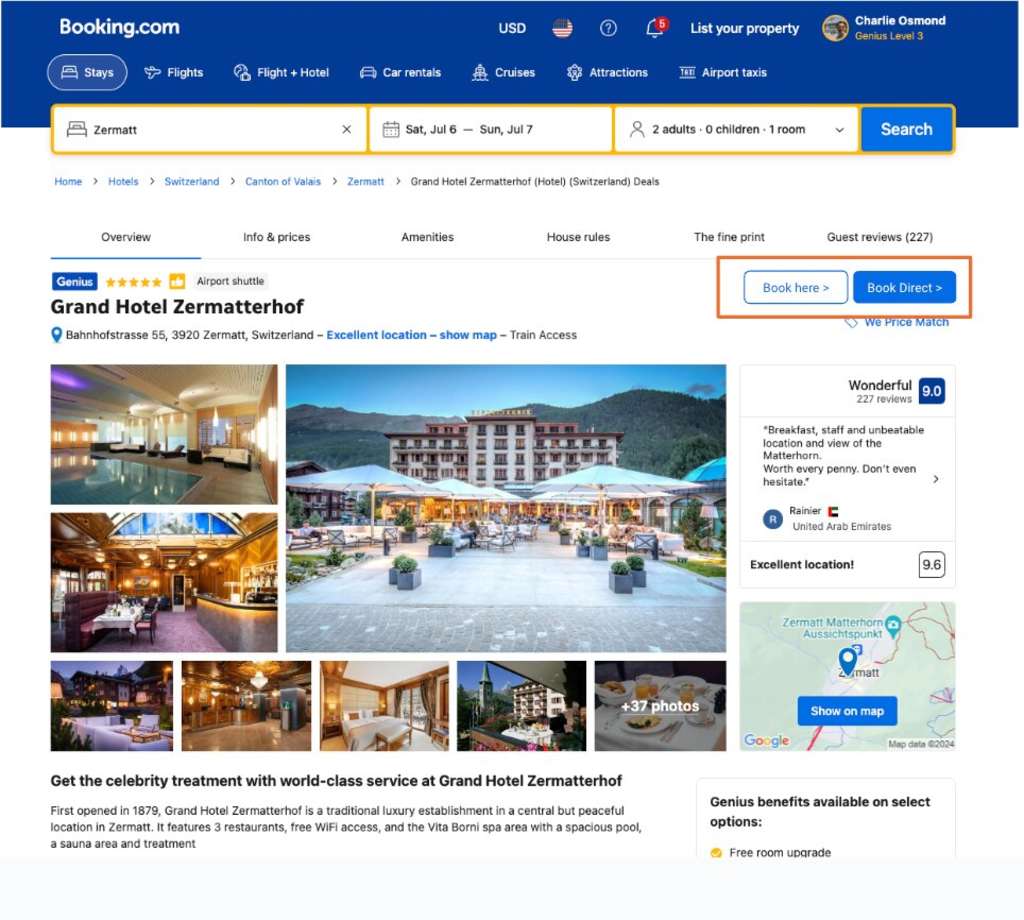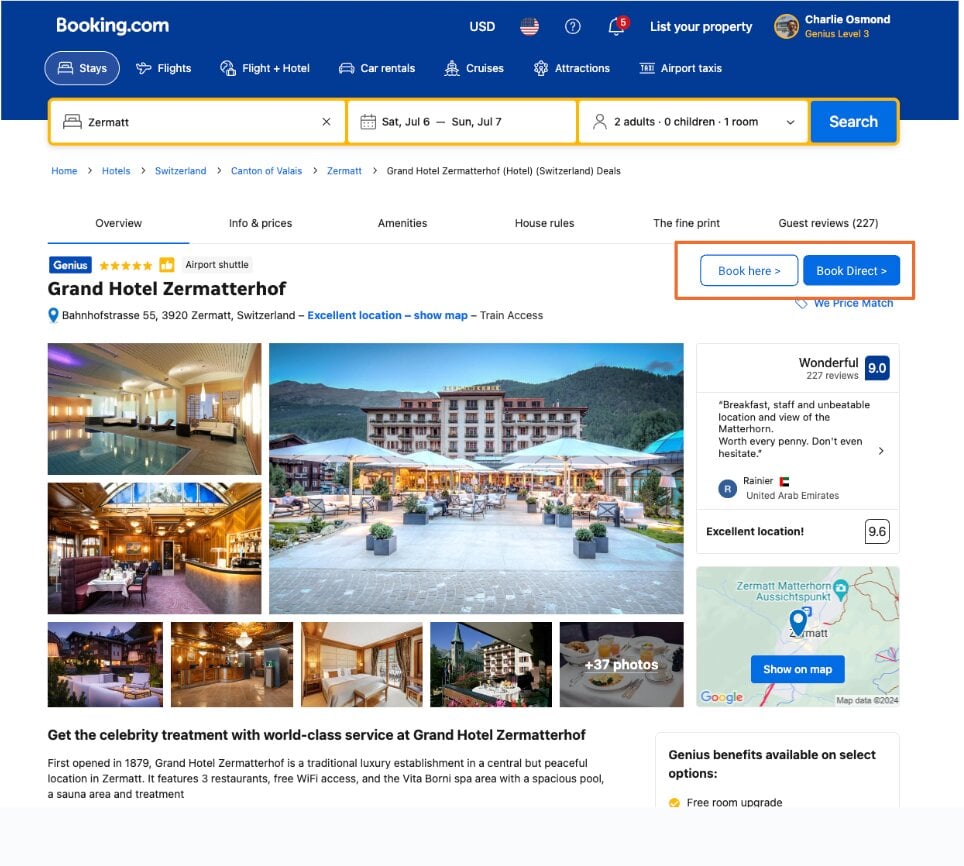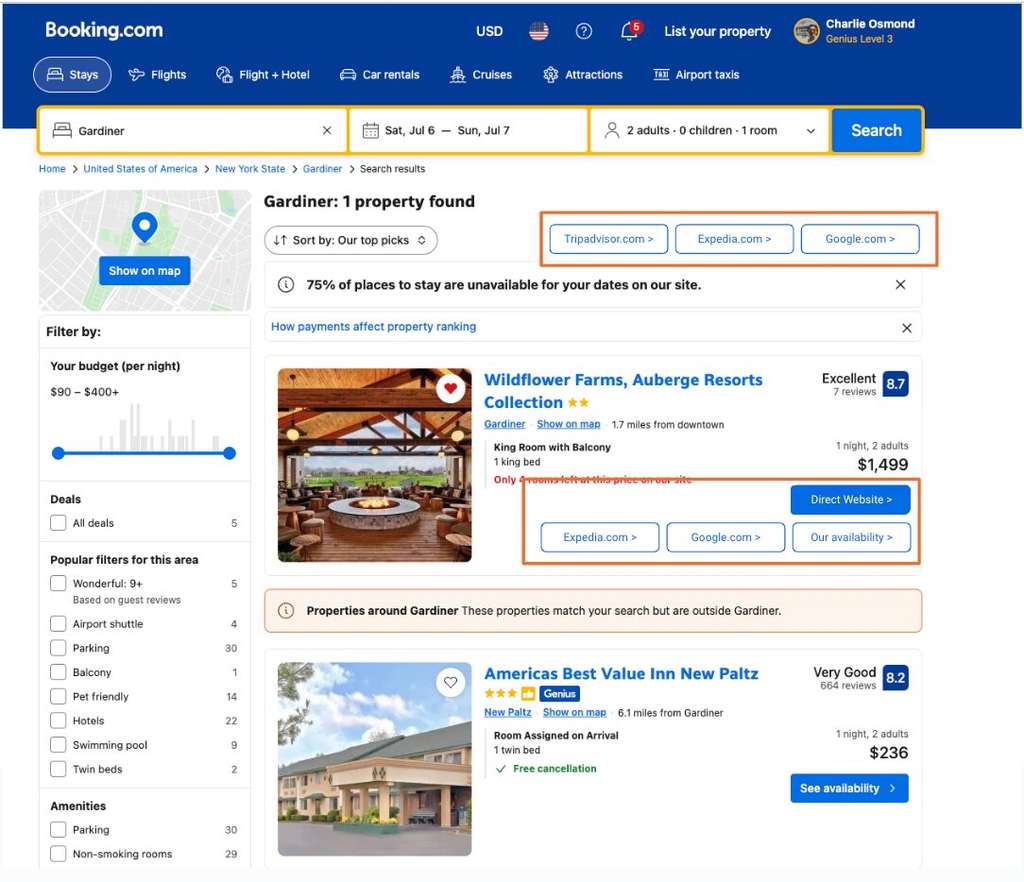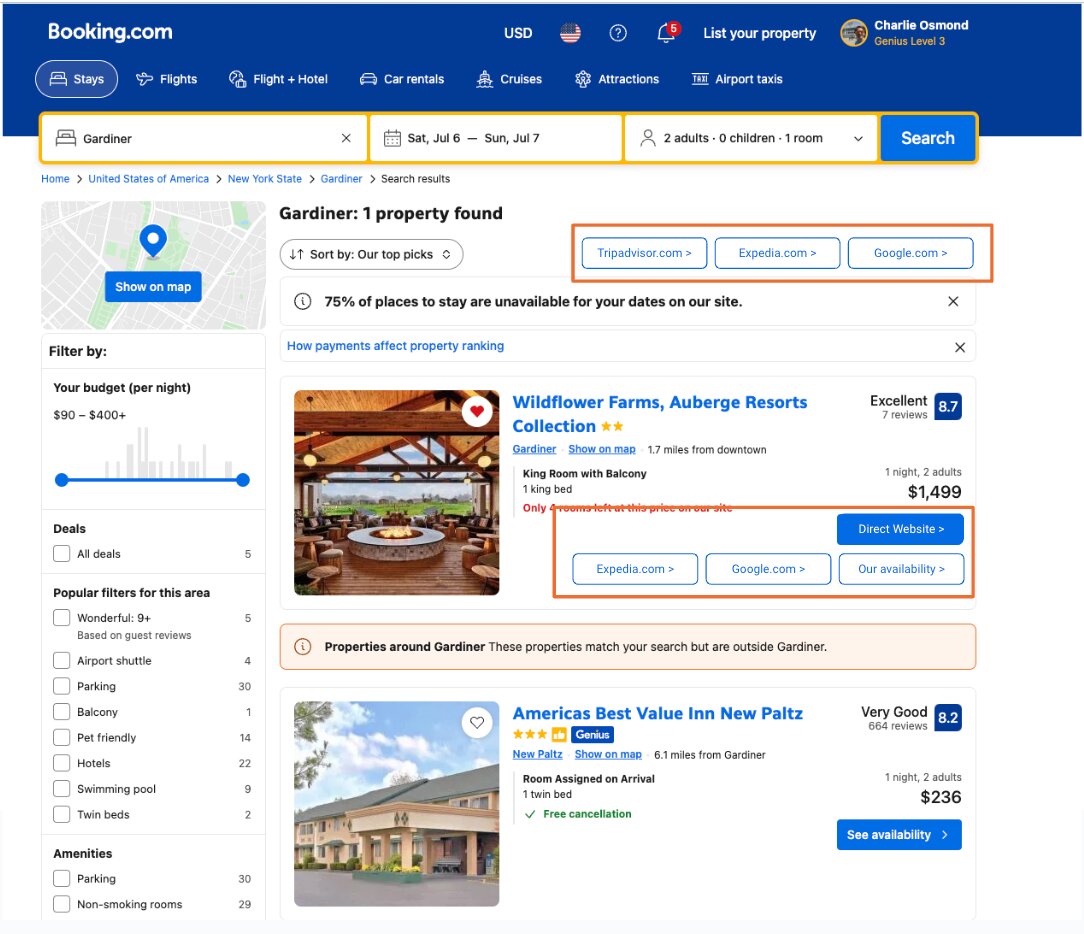Booking.com’s DMA deadline is approaching — what can hoteliers expect?
Discover how the EU's Digital Markets Act impacts Booking.com, and what changes we might expect to see from their November 14th announcement.

On May 13th 2024, Booking.com was the only Online Travel Agency (OTA) to be designated as a “gatekeeper” under the EU’s new Digital Markets Act, meaning they had six months to comply with the law’s stringent regulations.
This week, those six months are up, and on November 14th Booking.com will release a compliance report detailing the steps that they will be taking to comply with their gatekeeper status. The risk is potentially huge: when Google - one of the first designated gatekeepers - revamped the way they presented hotel booking information in EU search results back in January 2024, Triptease’s data found that direct hotel bookings from Google search results dropped by 30%.
But hotel bookings are just a small part of Google’s overall search business. By contrast, one industry insider described DMA gatekeeper status as “an existential threat for Booking.com” that could cause real disruption to their business and 69.3% EU market share. Naturally, Booking.com recognize this risk, making the rather more reserved observation that: “we are and will in the future become subject to additional rules and regulations that may not be applicable to our competitors … which could adversely impact our business.” Even this understated framing looks more ominous when you’ve already identified that “intense competition could reduce our market share and harm our financial performance”.
In the words of Triptease co-founder Charlie Osmond, “Booking.com has put extraordinary investment into creating this amazing shopping experience and booking platform, and they’re now going to be pushed into making changes. So it’s going to be extraordinary to see how that impacts the consumer’s experience.”
Let’s take a look at what the impact of the DMA could be, and some changes Booking.com might make.
What is the DMA?
First, a quick recap. The Digital Markets Act, or DMA, is an EU-wide legislation designed to regulate the power of online gatekeepers like search engines, social networking sites, or — in the hospitality world — OTAs. The act aims to create a fairer business landscape in the EU, and to reduce the outsize influence of these large players in the market. The DMA covers ten different types of platforms, with slightly different regulations for each type. Booking.com is classified as an “Online Intermediation Service” - a Very Large Online Platform that connects consumers with goods and services.
What are the regulations imposed on gatekeepers by the DMA?
The European Commission has released specific guidelines for how gatekeepers will have to proceed in order to avoid significant consequences, including fines of up to 20% of the company’s total worldwide annual turnover in the case of repeated infringements.
DOs of the DMA:
- Gatekeepers must allow third parties to inter-operate with the gatekeeper’s own services in certain specific situations
- Gatekeepers must allow their business users access to data generated through their use of the gatekeeper’s platform
- Gatekeepers must allow their business users to promote their offer and conclude contracts with their customers outside the gatekeeper’s platform
DON’Ts of the DMA:
- Gatekeepers can’t treat services and products offered by themselves more favourably in ranking than similar services or products offered by third parties on the their platform
- Gatekeepers can’t prevent consumers from linking up to businesses outside their platforms.
Google and the DMA
Google was one of the first designated gatekeepers named by the European Commission, so keeping an eye on the changes they’ve made is key when considering potential impacts of the DMA on Booking.com.
Many hoteliers initially felt that the DMA could have a positive impact on direct bookings coming from Google, but we have generally seen the opposite. Google’s EU search results page changes have pushed direct channels further down, and have led to fewer “date selected” searches on metasearch - all of which is bad news for hotels looking to drive direct bookings. Check out our webinar on the DMA, Google and Booking.com for a more detailed breakdown of how Google search looks in the EU in the aftermath of the DMA, and the impact on hotels.
When evaluating the impact of the DMA on Google, it’s important to remember that Google is a platform where other providers have always been represented through paid search ads and organic search results (albeit less prominently). The negative impact of DMA gatekeeper compliance will affect only a small part of what Google does. On the other hand, Booking.com’s core business relies heavily on controlling its booking interface and consumer relationships — so enforcement of the key DMA regulations could be devastating to their EU business.
How might Booking.com modify their offering to comply with the DMA?
Looking at the Booking.com website in the EU today, it’s largely the same as it was back in May when their gatekeeper status was confirmed. We can only speculate the types of changes we may expect to see , but it’s likely they’ll have a significant impact.
Based on the guidelines, there are some specific areas that we expect Booking.com to be addressing in next Thursday’s report.
Elimination of Rate Parity Clauses
Historically, Booking.com enforced rate parity clauses, preventing hotels from offering lower prices on their own websites compared to those listed on the platform. Back in July, they announced the end of EU parity clauses, meaning that hotels could no longer be penalized by Booking.com for offering lower rates direct.
However, Booking.com still employ a tactic called “algorithmic persuasion”. That means while hotels can’t be penalized for not offering the best rate to Booking, they can be rewarded when they do. We imagine that there may be some further discussion around this, as algorithmic persuasion could still be seen as exercising undue pressure on hotels under the DMA.
Adjustments to booking options displayed onsite
The DMA stipulates that gatekeepers cannot self-preference, meaning that in theory Booking.com will have to offer alternative booking avenues onsite for customers. Yes, you read that correctly - in theory Booking.com may have to include equally prominent links to other websites where consumers could choose to book the same rooms.
Of course, we would love to see them include an avenue for direct bookings. Maybe something like this:
In this example, guests could have the option to either book through Booking.com - or direct via the hotel’s website.
However, not self-preferencing doesn’t necessarily mean boosting direct sales. There’s also a chance that Booking.com could also start displaying booking options for other third-party sites like Google or Tripadvisor.
Enhanced data sharing with hoteliers
The DMA mandates that gatekeepers provide business users access to data generated through their platforms. This could result in Booking.com allowing hotels to access valuable insights that are currently withheld - including booking patterns, customer demographics, and performance metrics, enabling hotels to make informed decisions and tailor their offerings more effectively.
It could also mean that Booking.com shares more data with hotels around their overall marketing strategies - including how they are promoting them through paid search and other offsite channels.
Allowing direct communication with guests
One of the major drawbacks for hotels when a guest books through an OTA is losing the direct line of communication. Currently, in the case of Booking.com, all communication occurs through the platform - so the hotelier doesn’t have access to that guest’s information. DMA compliance could mean that Booking.com no longer requires hotels to communicate with guests solely within the platform - especially since they can’t keep customers from linking up with business outside it. It seems likely they will do all they can to avoid such an outcome however, since - as hoteliers know only too well - first-party guest data and relationships provide significant value.
Introduction of interoperability features
Currently, it can be challenging for hoteliers to sync up their Booking.com listings, creatives, and data with their other internal and external systems. With the DMA’s focus on interoperability, there’s a chance that we will see Booking.com introduce more APIs and exportable features that can be joined up more effectively with hotels’ other tools.
How much change are we likely to see from Booking.com - and how quickly?
While Booking.com have to take these regulations seriously to continue operating in the EU, it’s unlikely that they’re going to immediately make major changes without pushing back- in fact, they've already started. We are likely to see them announce as little as possible, and then wait for feedback or further policing from the European Commission. Following the absolute letter of the law (whether that means providing direct booking links onsite, significantly increasing the data they pass on to hotels, or opening up direct communication channels between guests and hoteliers) could have a massive effect on their business, so we imagine they will continue to push back as much as possible.
What could these changes mean for hotels?
It’s tempting to say that the DMA’s impact on Booking.com will help hotels grow their direct bookings — and there are definitely some changes coming up that could be very exciting.
With no parity clauses, more transparent access to booking data, and more direct customer communication, hotels could gain more autonomy and insights over their guest relationships and pricing strategies. Interoperability measures, like enhanced API support, could allow hoteliers to synchronize their listings and booking data across platforms seamlessly, reducing operational costs and effort.
However, it’s important for hoteliers to keep their eye on the ball. As Booking.com enact these changes, they’ll also be focusing on maintaining as much market share as possible, which will likely include increased marketing spend and tricky on-site tactics. The Triptease team will be keeping an eye out for Booking’s announcement, and we’ll be back with an update on how hotels can prepare for - and benefit from - the upcoming changes.
